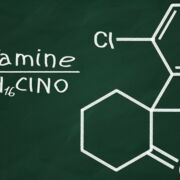For anyone battling a mental health disorder, it can be challenging to find an effective treatment plan that not only provides you long-lasting relief but doesn’t also come with unwanted side effects. Effective treatment isn’t always traditional antidepressants and therapy. Sometimes these methods don’t work well for all patients. That is why it is crucial for healthcare providers to continue seeking innovative, evidence-based treatment options that are proven to help individuals.
Ketamine Infusion Therapy 101
For several decades, continued research has shown that ketamine included antidepressive properties. The U.S. Food and Drug Administration (FDA) approved the use of ketamine for the induction and maintenance of anesthesia as it is a noncompetitive N-methyl-D-aspartate (NMDA) receptor, antagonist. It induces dissociative anesthesia, providing patients with pain relief, sedation, and amnesia.
It’s also a medication with fast-acting antidepressant properties that mental health experts have been studying with deep interest for over 20 years.
Ketamine infusion therapy has been incorporated into some treatment plans to help with psychiatric disorders such as major depressive disorder, bipolar disorder, and post-traumatic stress disorder (PTSD), as well as acute suicidal ideation. It is also being used for post-operative and chronic pain management. It can involve the administration of a single infusion or a series of infusions and is usually administered by IV, which can have effects lasting for anywhere from days to weeks. Although ketamine is not considered a first-line therapy to treat chronic pain or mental health disorders, studies have shown that it can be used off-label to treat patients with severe cases of depression, bipolar, and PTSD who have not responded to more conventional medications or therapies. Because of its fast-acting, lasting relief, ketamine has been labeled the most important breakthrough in the treatment of depression.
Fast-Acting Relief
As mentioned above, ketamine infusions have the advantage of providing patients with quick relief, oftentimes within hours. For those struggling with depression, or those who have not been able to find relief using other therapy methods, ketamine infusions have been able to bring them the relief they have been desperately seeking.
How Does it Work?
Researchers are still trying to pinpoint the mechanisms that provide the powerful effects, but they do know that ketamine helps to stimulate a rapid increase in glutamate. Glutamate is the main neurotransmitter that helps to encourage growth in a person’s brain. It strengthens and restores vital neural connections and pathways in regions in the brain that are impaired by depression. These new connections help to promote beneficial changes in brain circuit function.
Relief for Veterans
In addition to helping those with debilitating depression, ketamine has also been shown to help ease the symptoms of post-traumatic stress disorder (PTSD) that many veterans experience.
According to a recent article published in 2019, 30 US military veterans with PTSD participated in an observational study and underwent six one-hour ketamine infusions. The reason for this study was to discover whether ketamine could be treated to assist those with PTSD. Each participant was given a starting dose of 1mg of body weight that was adjusted afterward based on their experiences. Researchers aimed to create a psychotherapeutic response that would help the patient to experience the optimum transpersonal and transformative experience. Infusions continued to be administered over a two to three-week period of time.
Although not all participants benefited from the study, those who did showed a significant decrease of symptoms at a 50% reduction. Researchers concluded that because ketamine infusion therapy induced a transpersonal dissociative experience, this is a valuable tool to help treat combat-related PTSD. Patients reported that the ability to change their belief system or “reset” their thought patterns allowed them to transform their perspective regarding their traumatic experience.
High Rate of Success
Although ketamine infusion therapy is still being studied, research does show that it has a high rate of success when it comes to treating patients with persistent depression. With an excellent efficacy rate, ketamine infusion therapy has shown to benefit so many people who have not been able to achieve lasting relief through traditional medical solutions.
How Safe is Ketamine Infusion Therapy?
Although recent studies have shown ketamine infusion therapy to be a success for some individuals, mental health experts advise caution when using ketamine as a means of effective therapy. This is due in part because there is not enough information regarding the potentially negative consequences.
If you lined up 10 people with the same mental health disorder, chances are each one of them will disclose to you their own unique and individualized symptoms. Mental health is not a one-size-fits-all, and therefore effective treatment can’t be either. The National Alliance on Mental Illness reported that in 2019, 51.5 million adults in the United States experienced some form of mental illness. Approximately two in three people who suffer from major depression reported achieving lasting symptom remission through traditional forms of medications and therapy; one in three reported finding no relief. It doesn’t matter how small of a stat that may appear, no one should have to live in pain, whether it be psychological or physical. The mental health field continues to seek innovative, and evidence-based treatment for anyone struggling. Reach out to Achieve Concierge to learn more about ketamine infusion therapy. Call us today at (619) 393-5871.



